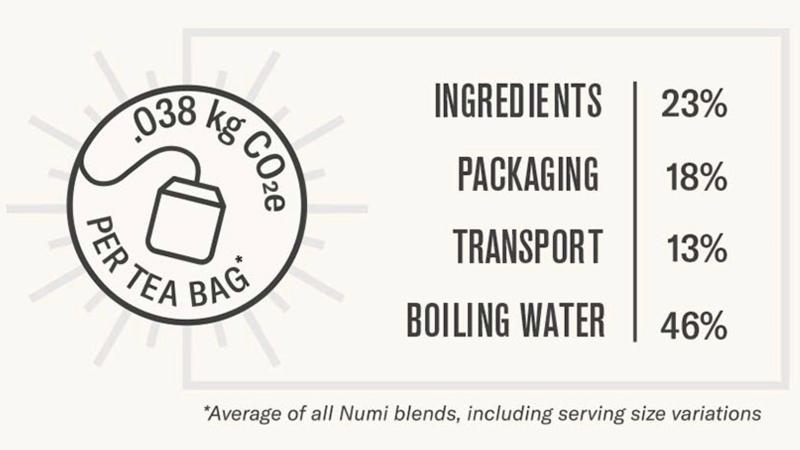Numi Organic Tea announced a new carbon footprint label, which will be included on all of its tea boxes beginning in the first half of 2022.
The new label is the first of its kind among U.S. tea producers and breaks down each product’s emissions into four categories – ingredients, packaging, transport and preparation – so that consumers can easily understand the carbon impact of their tea purchases.

“Numi’s new Carbon Footprint Label is our commitment to the planet and we believe it’s vital to share our carbon number with consumers,” said Reem Hassani, chief brand officer and co-founder of Numi. “We hope this big step for sustainability encourages other brands to follow our lead and commit to sharing their carbon footprint. The more of us that join this movement, the more context consumers will have when considering the environmental impact of their daily habits. Consumers are looking for a way to take action against climate change and we want to empower them with the information they need to do that.”
Numi worked with Planet FWD, the leading carbon management platform for consumer brands, to estimate an average product carbon footprint for all its teas and botanical products. In doing the study, Numi discovered that nearly half of a tea bag’s carbon footprint (46 percent) comes from boiling water. Consumers can reduce emissions by using an electric tea kettle, boiling only the amount of water they need, and opting for clean energy sources where available. Numi also found that its tea is preferable to coffee when it comes to carbon impact. The carbon footprint of a cup of Numi tea is 86 percent lower than a cup of conventional espresso and 37 percent lower than a cup of sustainably produced espresso (see footnote).
Numi is a Climate Neutral Certified company, which means it measures, reduces and offsets 100 percent of annual Scope 1, 2 and 3 emissions. To identify the best opportunities for reduction, Numi uses its greenhouse gas (GHG) inventory to prioritize action based on the greatest emissions sources throughout the supply chain. Numi’s tea is carbon negative at the farm level because of regenerative practices like no-till farming, cover cropping, perennial planting, and agroforestry. From working with producers to explore renewable energy options to reducing corrugate in shipping to using plant-based packaging, Numi continuously works to reduce operational emissions across the lifecycle of a Numi teabag. And now consumers can have a view into the impact that work is having on the company’s GHG emissions and the “carbon cost” for a cup of tea.
For the last 10 years, Numi has worked with CarbonFund to offset 10,191 metric tonnes of CO2e from business operations. Since 2018, it has purchased credits from the Envira Amazonia project in Brazil, which supports a transition in land ownership to local communities and establishes alternatives to cattle ranching. Funding from the carbon offsets supports education, livelihood diversification and a health clinic. The project has protected nearly 500,000 acres of tropical rainforest to date.
Numi said it has an ongoing commitment to fighting climate change and reducing plastic waste. Thus, the company uses tea bags made from biodegradable, unbleached Manila hemp fiber – not plastic – and is the only tea company to offer a compostable wrapper for its tea bags, which keeps tea fresh while displacing the consumption of 14.3 metric tonnes of virgin plastic annually. Additionally, Numi provides fair wages and opportunities for tea farmers around the world, with over 14,000 people positively impacted by its Fair Trade and Fair Labor programs. Numi’s efforts (and sales) support Together for H2OPE, a program that provides tea farming communities around the world with access to clean, safe drinking water.
To learn more about Numi’s carbon footprint label, visit NumiTea.com/climate.
Footnote: Nab, C, Maslin, M. Life cycle assessment synthesis of the carbon footprint of Arabica coffee. Geo: Geography and Environment. 2020; 7:e96. https://doi.org/10.1002/geo2.96
Plan to Attend or Participate in the
World Tea Conference + Expo, March 21-23, 2022
To learn about other key developments, trends, issues, hot topics and products within the global tea community, plan to attend the World Tea Conference + Expo, March 21-23, 2022. The event will be celebrating its 20th anniversary, in addition to being co-located with Bar & Restaurant Expo. Visit WorldTeaExpo.com.
To book your sponsorship or exhibit space at the World Tea Conference + Expo, contact:
Veronica Gonnello
(for companies A to G)
e: [email protected]
p: 212-895-8244
Tim Schultz
(for companies H to Q)
e: [email protected]
p: (917) 258-8589
Fadi Alsayegh
(for companies R to Z)
e: [email protected]
p: 917-258-5174
Also, be sure to stay connected with the World Tea Conference + Expo on social media, for details and insights about the event. Follow us on Twitter, Facebook, Instagram and LinkedIn.
